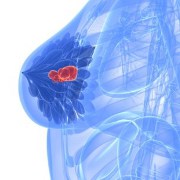 Photo: Getty Images
Photo: Getty Images
Most women know about mammograms for early detection of breast cancer. The BRCA1 and BRCA2 genetic tests are much less widely known. Dr. Douglas E. Levy and colleagues at Massachusetts General Hospital, Harvard Medical School and the Dana-Farber Cancer Institute, all in Boston, Massachusetts, provided a report on the guidelines for genetic testing.
Mutations in either of the two genes BRCA1 or BRCA2 are associated with a lifetime breast cancer risk of 35 to 84 percent, and a lifetime risk of ovarian cancer of 6 to 55 percent, according to Levy's report.
Genetic testing for these mutations is often abbreviated as BRCA1/2. In the general population, these mutations occur in only 1 in 300 to 500 women. In women with a strong family history of breast or ovarian cancer, the rate is 1 in 12. “A negative test result in a member of a family in which a disease-associated mutation has been identified should provide great reassurance,” Levy noted.
Guidelines for BRCA testing have been published by the American Society of Clinical Oncologists (ASCO) and the National Comprehensive Cancer Network (NCCN). Levy and colleagues analyzed data from the 2000 and 2005 National Health Interview Surveys and found that only 54 percent of high-risk women were aware of the genetic test, 10 percent had discussed the test with a health care professional, and 1.4 actually had the test.
If you don't have a BRCA mutation, you can still get breast or ovarian cancer. Dr. Sandhya Pruthi and colleagues at the Mayo Clinic in Minnesota pointed out that approximately 80 percent of breast cancer and 90 percent of ovarian cancer are believed to be “sporadic with no associated family history”. Thus, women with no family history of breast or ovarian cancer are unlikely to benefit from genetic testing.
Women who may benefit from this test have family histories including one or more of the following:
1. Multiple cases of breast cancer before age 50,
2. Ovarian cancer,
3. Breast and ovarian cancer in the same woman,
4. Cancer in both breasts,
5. Male breast cancer,
6. A relative with documented BRCA1 or BRCA2 mutation,
7. Breast cancer in relatives of several generations,
8. Ashkenazi Jewish heritage combined with family history of breast and/or ovarian cancer.
References:
1. Levy DE et al, “Guidelines for genetic risk assessment of hereditary breast and ovarian cancer: Early disagreements and low utilization”, J Gen Intern Med 2009; 24(7): 822-8.
http://www.ncbi.nlm.nih.gov/pubmed/19455369
2. Pruthi S et al, “Identification and management of women with BRCA mutations or hereditary predisposition for breast and ovarian cancer”, Mayo Clin Proc. 2010; 85(12): 1111-1120.
http://www.ncbi.nlm.nih.gov/pubmed/21123638
Reviewed July 18, 2011
by Michele Blacksberg R.N.
Linda Fugate is a scientist and writer in Austin, Texas. She has a Ph.D. in Physics and an M.S. in Macromolecular Science and Engineering. Her background includes academic and industrial research in materials science. She currently writes song lyrics and health articles.
Edited by Shannon Koehle





Add a CommentComments
There are no comments yet. Be the first one and get the conversation started!